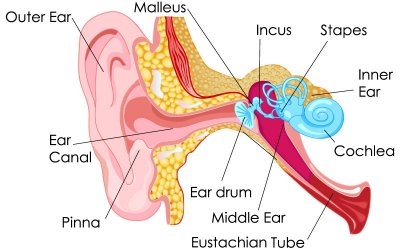Fading Volumes: The Scary Truth about Deafness and Hearing Loss

Haadi Hafeez
The loss of one’s hearing is something we have all attributed to old age. When talking to our grandparents or the elderly we slightly raise the volume of our voices in order for them to better hear us. We sit closer, speak into their good ear, and talk slowly. But hearing loss and to a greater extent deafness affects a wide range of populations, occurring at birth, though traumatic events or even with the use of certain medications. All of these instances have varying degrees of effect on an individual’s leveling of hearing, ranging from mild loss of hearing, to complete deafness.
To better understand the types of
hearing loss, we have come to categorized them into three groups, Sensorineural, Conductive, or mixed. What makes these categories distinct is by way of the conduction of sound either though air or bone. Sound level is measured in decibels, and the threshold for safe levels being under 85db. For some context, a conversation between two people is about 60db, while a rock concert is about 110db
[1].
 Sensorineural
Sensorineural is the most common hearing loss type which happens to 90% of hearing loss patients
[2]. It is due to the damage of the inner ear and adjacent structures, such as the cochlea which contains tiny hairs that are important for conduction of sound. The vestibulocochlear nerve which is sending signals though your brainstem to your brain is also involved.
Common Causes of Sensorineural Hearing loss:
- Presbycusis - Hearing loss that happens gradually as we grow older, with approximately one in three persons affected by age 65. The loss is usually greater with high pitched noises such as a telephone ring or bird chirping and seen more commonly in men [3].
- Meniere’s disease - Characterized by vertigo (dizziness), tinnitus (ringing) and hearing loss. It is due to excess fluid buildup called endolymph in a part of the inner ear called the labyrinth. Reasons for its development are relatively inconclusive, but are thought to be due to blood vessel constriction, viral infections, allergies, or autoimmune reactions.
- Ototoxic medication - Diuretics (eg.Lasix™), antibiotics (eg.Streptomycin) and even Aspirin in high doses can damage the structures of the inner ear. Often temporary, but can cause long term damage if not managed properly [4].
- Intrauterine Infection - infections such as Rubella and Cytomegalovirus that happen while still pregnant can affect the vestibulocochlear nerve causing mild to profound levels of hearing loss. If not managed early in a child’s life, speech and language deficits will develop.
- Acoustic trauma - being in the presence of extremely loud noises even for a couple of seconds can damage cochlea hair cells. High volumes on personal music devices, loud rock concerts, and firearms have decibel ratings from 105-165, making them hazardous to your hearing over time, and cannot be medically or surgically corrected in severe cases.
Conductive hearing loss occurs due to problems in the middle and outer ear. This affects the passage of sound from the ear drum to the inner ear. Unlike sensorineural, delicate nerve fibers are not damaged, and this type of hearing loss can often be reversed with medical intervention. Common causes include:

- Ear infection.
- Perforated Eardrum.
- Impacted Earwax.
- Presence of foreign body.
The most common way to remedy hearing loss is with a hearing aid, an electric device typically worn behind the user’s ear or in the ear canal. Hearing aids are considered the most effective treatment for hearing loss. They work by amplifying sound vibrations allowing what surviving cochlear hair cells left to interpret sound more accurately. However if the level of hearing loss is too great, hearing aids would be ineffective
[5].
Haadi Hafeez
January 20, 2016

 Sensorineural is the most common hearing loss type which happens to 90% of hearing loss patients [2]. It is due to the damage of the inner ear and adjacent structures, such as the cochlea which contains tiny hairs that are important for conduction of sound. The vestibulocochlear nerve which is sending signals though your brainstem to your brain is also involved.
Sensorineural is the most common hearing loss type which happens to 90% of hearing loss patients [2]. It is due to the damage of the inner ear and adjacent structures, such as the cochlea which contains tiny hairs that are important for conduction of sound. The vestibulocochlear nerve which is sending signals though your brainstem to your brain is also involved.
